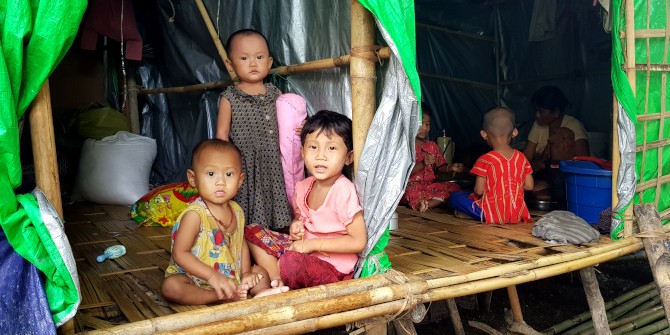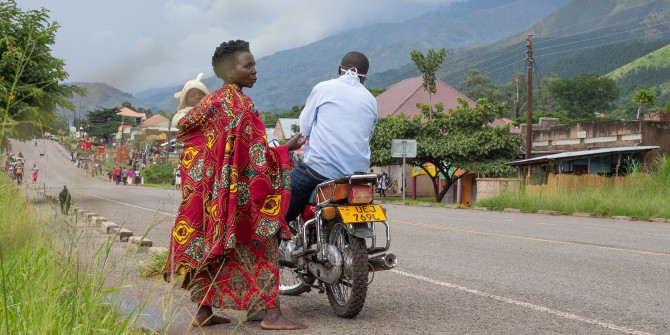In Italy a Green Pass showing proof of vaccination is now needed to get a job, even an informal one. Sara Vallerani (LSE) talked to undocumented migrants about their experiences of the system and why they mistrust the Italian state.
The threat of overwhelmed health systems has receded, but Italians continue to manage the socio-economic and psychological effects of COVID and the isolation of restrictions. The clinical and socio-economic burden of the pandemic has been significantly higher among migrant groups. They have been at higher risk of contracting COVID and are disproportionately represented in hospitalisations and deaths and affected by the socio-economic burden of the pandemic.
I interviewed migrants without papers in Rome. They were residents of housing schemes and users of Nonna Roma, a charity. They mainly reported that they came from Bangladesh, Ecuador, and Venezuela. Some work in service sectors (healthcare or social care), caregiving, and cleaning companies. Others are unemployed and lost their jobs during the lockdown.
Between 500,000 and 700,000 migrants are believed to live in Italy. Prior to COVID, those without papers faced several barriers in accessing healthcare, and since the crisis began they have significantly reduced their visits to health services. However, undocumented migrants have been largely forgotten by policymakers during the pandemic, to the point that they have been called the “invisibles” of COVID.
The pandemic allowed many countries to halt bureaucratic processes, leading to rejections of asylum applications and delays in requests for regularisation. These delays meant it became even more difficult for migrants to access health care. These vulnerabilities were worsened by the design of the Italian COVID vaccination campaign, which perpetuated ideas of inclusion and exclusion in the citizenship body. Regardless of comorbidities and age factors, undocumented people such as migrants and the homeless have largely been excluded from accessing vaccines.
Several studies indicate that undocumented people in Italy may be more reluctant to receive a COVID vaccine. However, research on attitudes towards vaccination among ethnic groups, and their experiences of it, is scarce. The institutional barriers that prohibit access to vaccines are under-studied. Furthermore, while vaccination should automatically be followed by the issue of a Green Pass certificate, many migrants receive it only after months of delays.
Green Pass certification has become an instrument of coercion and blackmail in the hands of employers
This combination of structural barriers, systemic discrimination, and control mechanisms has heavily affected attitudes towards vaccination, which are mixed, but frequently characterised by frustration, anxiety and a widespread feeling of coercion. For some people, the delay in issuing a Green Pass reinforced the feeling of coercion and injustice. “If I have had the vaccine, why don’t I get the Green Pass?” asked one interviewee.
Indeed, for many migrants in this study, it was the governance and policing of COVID that made them fearful, rather than contracting the virus and becoming sick. COVID and vaccination were generally perceived in relation to the Green Pass.

Despite a lack of legal contracts, benefits, social protection and health coverage, the employers of undocumented people working in extremely precarious conditions often still require a Green Pass. For employers who are afraid of being fined, Green Pass certifications seem to have become more urgent than regularising their employees’ work conditions. They, on the other hand, are in no position to make any claims. Not only does this help to normalise illegal and precarious employment, but it also shifts responsibility onto individual workers who are already facing exploitative conditions. In this respect, Green Pass certification has become an instrument of coercion and blackmail in the hands of employers, making undocumented workers still more vulnerable.
Efforts to encourage vaccination need to consider people’s perceptions and experiences of the state. If these perspectives are ignored, a campaign may simply foster mistrust in the state. Italian public health policies and interventions have often disregarded the health of undocumented migrants. While the vaccination campaign represented a step towards addressing these issues, it was accompanied by frequent elements of coercion. A narrow focus on vaccination as an end hides the multi-dimensional relations between vaccination and “trust”. These complex relations can only be properly addressed if the government plans structural interventions (e.g. in health, migration and labour policies) that will work beyond emergencies, and which will not lead to coercion.
Focusing only on vaccine ‘hesitancy’ is misleading. It shifts responsibility onto individuals, drawing moral conclusions about their choices to be (un)vaccinated, while simultaneously disregarding the structural elements that inform those choices
The Green Pass, in its focus on excluding the unvaccinated, follows a compound logic of exclusion which undocumented migrants and asylum seekers have faced even before the pandemic. The crisis has exacerbated it. Undocumented migrants often live in overcrowded accommodation, work in exploitative and precarious sectors and experience difficulties in accessing public services and healthcare.
Focusing only on vaccine ‘hesitancy’ is misleading. It shifts responsibility onto individuals, drawing moral conclusions about their choices to be (un)vaccinated, while simultaneously disregarding the structural elements that inform those choices. If we fail to consider and address the systemic vulnerabilities to which marginalised groups are exposed, it fosters deep mistrust in institutions and public services. ‘Mistrust‘ needs to be understood less as the basis for vaccine hesitancy, and more as something created by processes that ignore the structural mechanisms of social exclusion.
This post represents the views of the author and not those of the COVID-19 blog, nor LSE. It is the third of four posts in a series based on the LSE’s Ethnographies of (Dis)Engagement study.






1 Comments